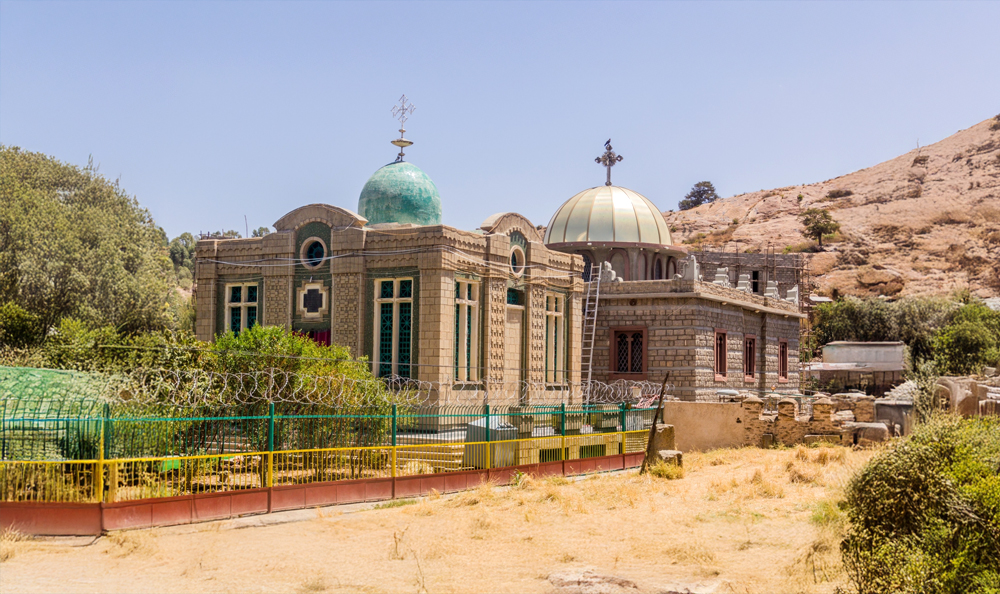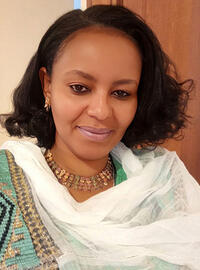The Cultural Advisory Council Welcomes Ethiopia

The Cultural Advisory Council Welcomes Ethiopia
By Samrawit Muluneh, Addis Ababa, Ethiopia
Editor’s Note: The Cultural Advisory Council was established to enhance the cultural wisdom and awareness of the Foundation’s dissemination efforts while acquainting council members with the work of Urantia Foundation, so that both may better serve the readership within their cultures.
Samrawit lives in Ethiopia, and is a mathematics teacher. She discovered The Urantia Book in 2020 and has since sought to connect with fellow readers across Ethiopia and Africa. She has worked closely with various individuals like Pato Banton to ensure wider access to the book, distributing many copies to people across Ethiopia. In addition to her passion for the revelation, Samrawit is a dedicated mindfulness meditation practitioner and trainer, having led a meditation session at the Ghana Urantia Africa Conference.
Samrawit joins Khatukhira Bernard of Uganda, Jisoo Han of South Korea and Felipe Arrigorriaga of Chile on the Cultural Advisory Council.
Ethiopia often conjures up images of Emperor Haile Selassie, reggae music, Arabica coffee, the Australopithecus afarensis skeleton named Lucy, and Raiders of the Lost Ark.
Ethiopian Christians have long claimed that the Ark of the Covenant rests in a chapel in the small town of Aksum, in the country's northern highlands. Tradition holds that the Queen of Sheba went to Israel to visit King Solomon and returned home pregnant. She gave birth to King Menelik I, who visited his father and brought the ark home to Ethiopia. You might know us as the land of Cush, which is mentioned in the Bible 38 times.
Ethiopia has a rich and interesting history that dates back thousands of years. It also has a rich religious landscape. The Ethiopian Orthodox Church plays a significant role in the culture and identity of many Ethiopians. It is known for its unique traditions, colorful festivals, and the practice of fasting.
Christianity entered Ethiopia in the fourth century AD, when, according to Acts 8, an angel told Philip to travel south from Jerusalem to Gaza. There he encountered a eunuch, a court official of the Queen of Ethiopia, who was seated in his chariot, reading the Book of Isaiah. Philip told him that the scripture was about Jesus, the eunuch asked to be baptized, and the rest is history.
Islam has a long history in Ethiopia as well. When the prophet Muhammad sent the first Muslims, including his own daughter, King Ella Tsaham received them warmly and allowed them to exercise their religion freely. There are many traditional ethnic groups who maintain indigenous beliefs and practices that coexist peacefully with Christianity and Islam.
Located in the Horn of Africa, Ethiopia is a landlocked country bordered by Eritrea, Djibouti, Somalia, Sudan, and Kenya. It features diverse landscapes, including the Highlands, often referred to as the “Roof of Africa,” due to their rugged mountains and plateaus. We also have lowlands, such as Dallol, the lowest place in Ethiopia. The Rift Valley runs through the country, creating unique ecosystems and rich agricultural land. And then there is Lake Tana, the largest lake in the country, and the Blue Nile, which is a major tributary of the Nile River.
Ethiopia has the second-largest population in Africa after Nigeria. Home to over 80 distinct ethnic groups, it is one of the most ethnically diverse countries in Africa. It has a unique calendar, as well as its own alphabets and numbers. The rock-hewn churches of Lalibela, a UNESCO World Heritage Site, are considered one of Ethiopia's greatest architectural achievements.
Ethiopia is the only country in Africa that was never colonized! Our national language is Amharic, but many other languages, such as Oromo, Tigrinya, and Somali, are widely spoken.
English is taught in schools, but only 10% of the population can read and understand it. As a rule, Ethiopians are not big readers. Nevertheless, I bring The Urantia Book with me whenever I travel, and I continue to share it with others.
I am pleased to serve on the Foundation’s Cultural Advisory Council. Ethiopia’s rich tapestry of history, culture, and natural beauty make it a fascinating country with a unique identity in Africa and the world. While I would not be qualified to do this work myself, I hope that someday The Urantia Book will be translated into Amharic.
